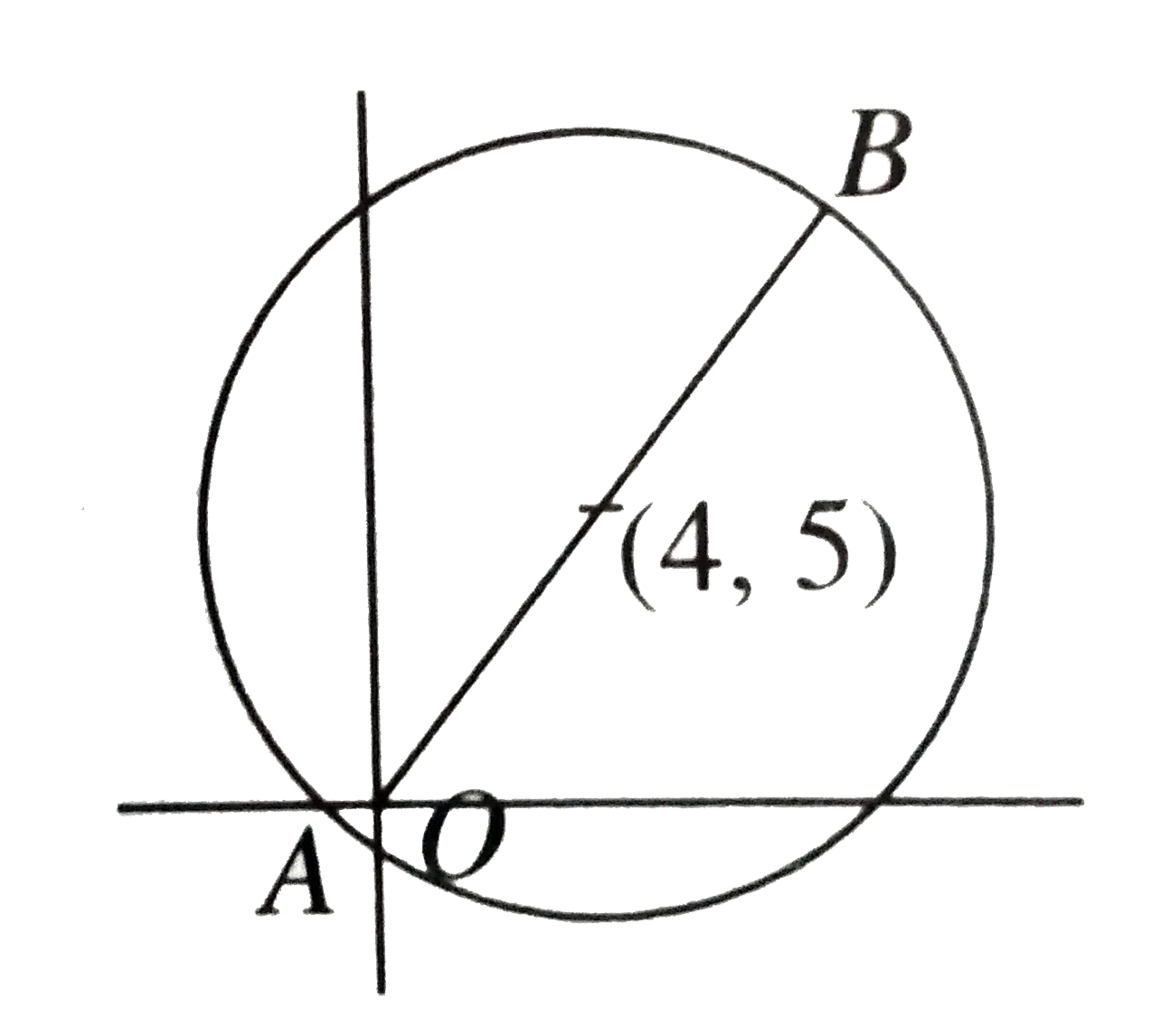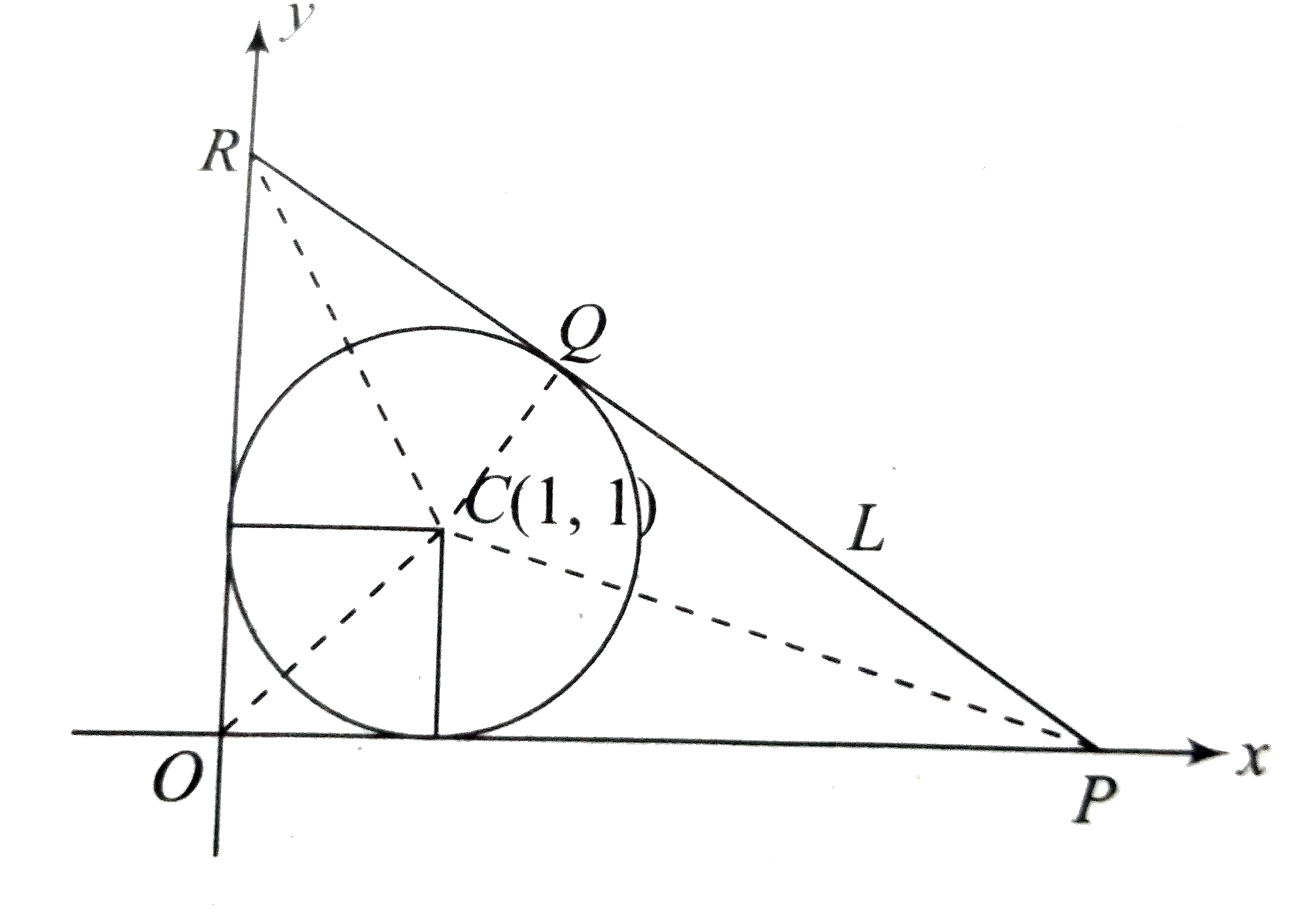Let z1 and z2 be complex numbers such that z21−4z2=16+20i and the roots α and β of x2+z1x+z2+m=0 for some complex number m satisfies |α−β|=2√7. The value of |m|,Solution in Bengali
14
2√7
7+√41
2√6−4
The correct Answer is:C
(c) We have α+β=−z1 and αβ=z2+m
(α−β)2=(α+β)2−4αβ
=z1(^(2)−4z1−4m
=16+20i−4m
Since|α−β|=2√7, we have |4+5i−m|=7……(i)
Therfore, m lies on a circle having centre at (4,5) and radius =7.

|m|max=OB=7+√41
Maximum argument of m is π which occurs at point A,
Let m=x+iy
For point A, m=x
So from (i), |4+5i−x|=7
or (x−4)2=24
⇒x−4=±2√6
⇒x=4±2√6
For point A, x=2√6−4
Topper's Solved these Questions
- COMPLEX NUMBERSBOOK - CENGAGE PUBLICATIONCHAPTER - COMPLEX NUMBERSEXERCISE - ILLUSTRATION
110 Videos
- COMPLEX NUMBERSBOOK - CENGAGE PUBLICATIONCHAPTER - COMPLEX NUMBERSEXERCISE - SLOVED EXAMPLES
15 Videos
- COMPLEX NUMBERSBOOK - CENGAGE PUBLICATIONCHAPTER - COMPLEX NUMBERSEXERCISE - Matching Column
1 Videos
- CIRCLESBOOK - CENGAGE PUBLICATIONCHAPTER - CIRCLESEXERCISE - Comprehension Type
8 Videos
- CONIC SECTIONSBOOK - CENGAGE PUBLICATIONCHAPTER - CONIC SECTIONSEXERCISE - All Questions
102 Videos
Similar Questions
Evaluate :
(i) i135
(ii) i−47
(iii) (−√−1)4n+3,n∈N
(iv) √−25+3√−4+2√−9
View Solutionifωandω2 are the nonreal cube roots of unity and [1/(a+ω)]+[1/(b+ω)]+[1/(c+ω)]=2ω2 and [1/(a+ω)2]+[1/(b+ω)2]+[1/(c+ω)2]=2ω , then find the value of [1/(a+1)]+[1/(b+1)]+[1/(c+1)].
View SolutionEvaluate :
i−47
View Solution
In the diagram as shown, a circle is drawn with centre C(1,1) and radius 1 and a line L. The line L is tangent to the circle at Q. Further L meets the y-axis at R and the x-axis at P in such a way that the angle OPQ equals θ where 0<θ<π2.
Coordinate of Q is
View SolutionGiven that A(1,1) and B(2,−3) are two points and D is a point on AB produced such that AD=3AB. Find the coordinates of D.
View SolutionLet z1 and z2 be complex numbers such that z21−4z2=16+20i and the roots α and β of x2+z1x+z2+m=0 for some complex number m satisfies |α−β|=2√7.
The locus of the complex number m is a curve
View SolutionLet z_(1) and z_(2) be complex numbers such that z_(1)^(2)-4z_(2)=16+20i and the roots alpha and beta of x^(2)+z_(1)x+z_(2)+m=0 for some complex number m satisfies |alpha-beta|=2sqrt(7) . The maximum value of |m| is
View SolutionLet z1 and z2 be complex numbers such that z21−4z2=16+20i and the roots α and β of x2+z1x+z2+m=0 for some complex number m satisfies |α−β|=2√7. The value of |m|, when are(m) is maximum
View SolutionLet z1,z2,z3,z4 are distinct complex numbers satisfying |z|=1 and 4z3=3(z1+z2), then |z1−z2| is equal to
View SolutionConsider the complex numbers z1 and z2 Satisfying the relation |z1+z2|2=|z1|+|z2|2
Complex number z1/z2 is
View SolutionLet z1,z2 be two complex numbers such that |z1+z2|=|z1|+|z2|. Then,
View SolutionLet z_1 and z_2 be complex numbers such that z_(1)^(2) - 4z_(2) = 16+20i and the roots alpha and beta of x^2 + z_(1) x +z_(2) + m=0 for some complex number m satisfies |alpha- beta|=2 sqrt(7) . The minimum value of |m| is
View SolutionLet z1 and z2 be complex numbers such that z21−4z2=16+20i and the roots α and β of x2+z1x+z2+m=0 for some complex number m satisfies |α−β|=2√7.
The locus of the complex number m is a curve
View SolutionLet z1 and z2 be complex numbers such that z21−4z2=16+20i and the roots α and β of x2+z1x+z2+m=0 for some complex number m satisfies |α−β|=2√7. The value of |m|,
View SolutionLet z1,z2,z3,z4 are distinct complex numbers satisfying |z|=1 and 4z3=3(z1+z2), then |z1−z2| is equal to
View SolutionConsider the complex numbers z1 and z2 Satisfying the relation |z1+z2|2=|z1|2+|z2|2 Complex number z1z2 is
View Solution
